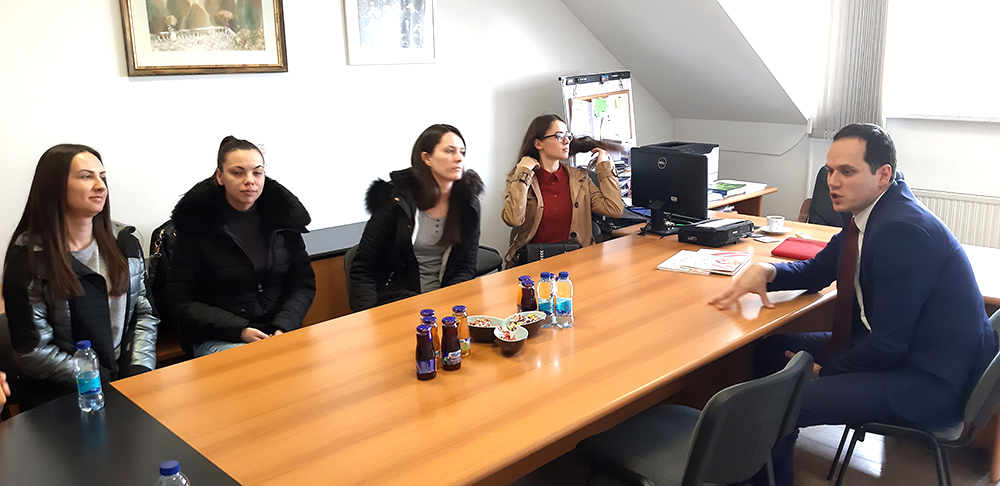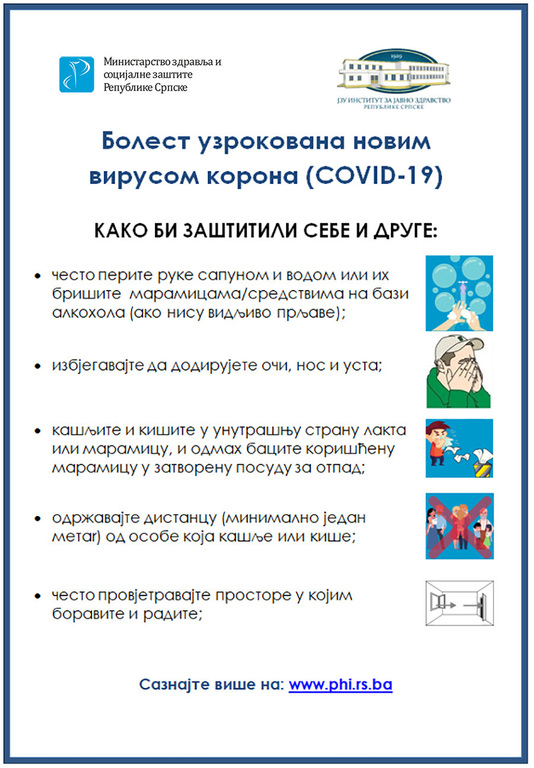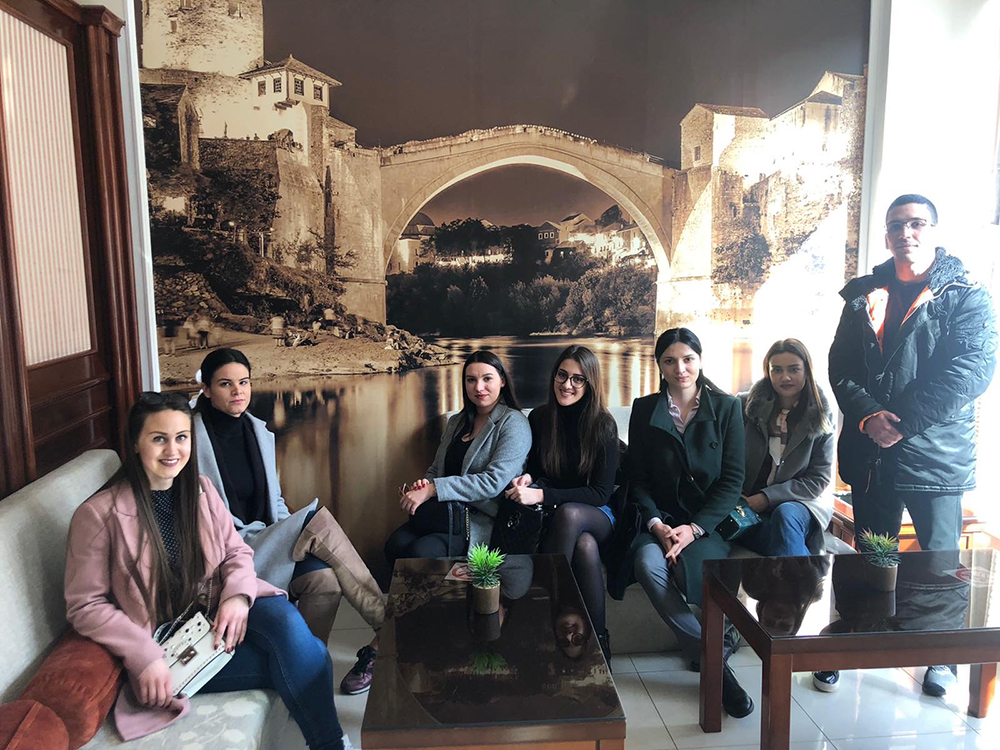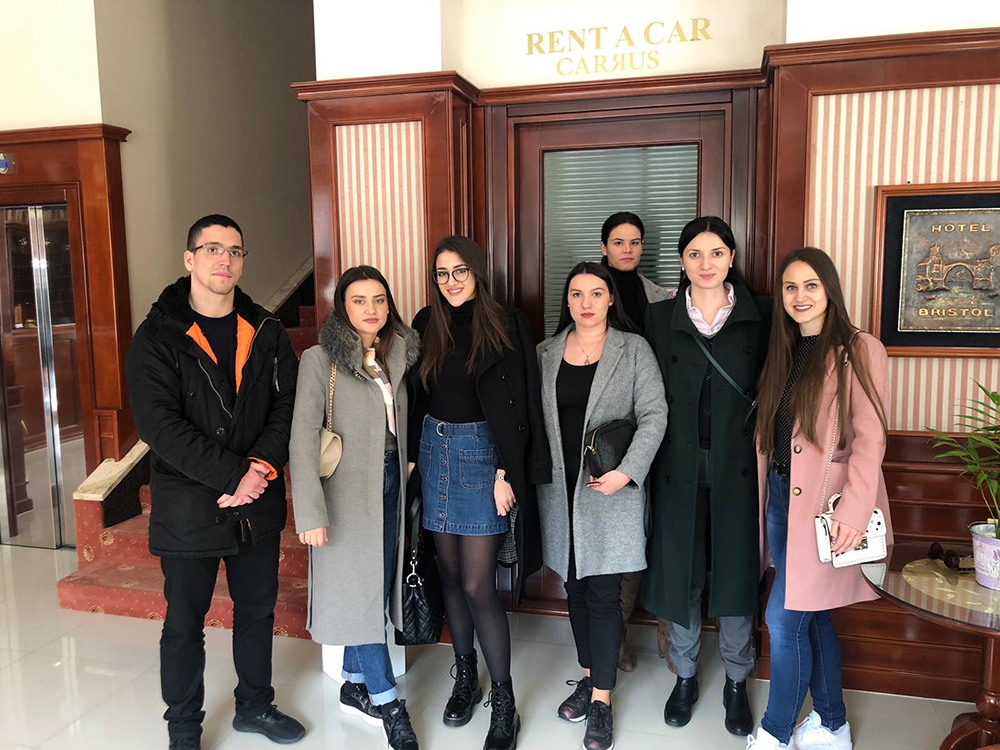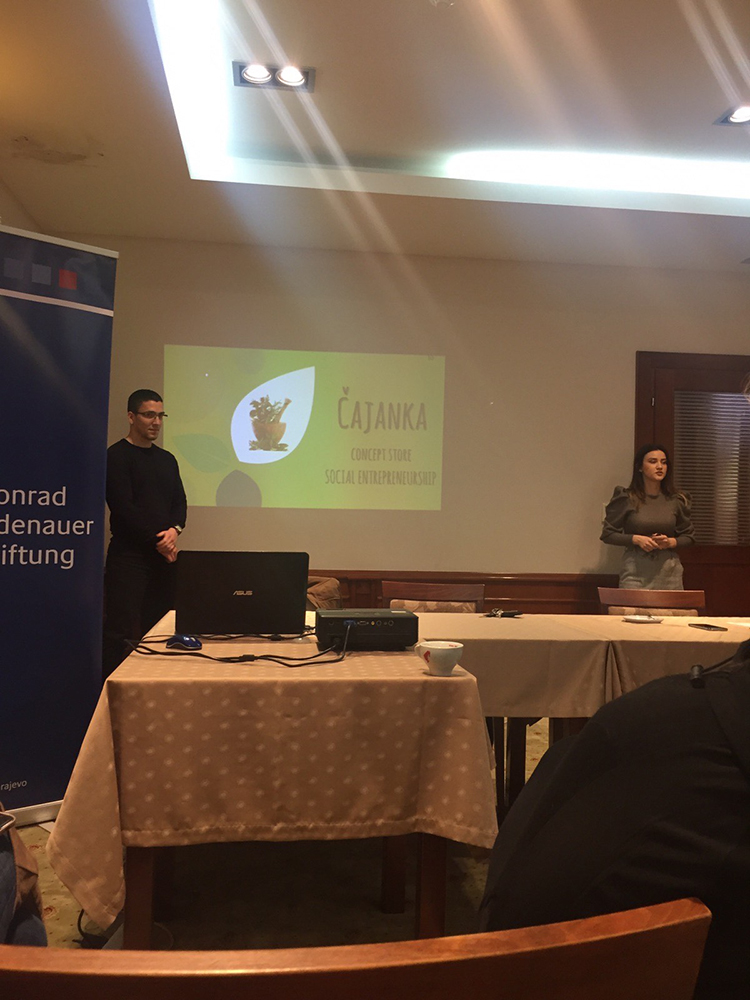Psychological support for UNIBL students
On 7th April 2020 Faculty of Philosophy of the University of Banja Luka and Association of Psychologists of the Republic of Srpska signed a Memorandum of Understanding on the launch of a psychological support service for students of the University of Banja Luka during the epidemic crisis.
It is envisaged that students of the University of Banja Luka who are facing certain difficulties and challenges of a psychological nature can seek and obtain support from certified psychotherapists free of charge and in an easy way. Students can seek support daily from 9am to 10pm by phone on 065 464 555 or by email: psiholoska.podrska@ff.unibl.org after which the coordinator will connect them with a psychotherapist.
Given the circumstances we are currently exposed to, it is expected that many of us will experience anxiety, tension, fear; loneliness and helplessness; irritability, anger and aggression; problems with concentration and learning; problems in organizing and structuring time; physical signs of anxiety; inability to communicate with loved ones; difficulty in performing daily activities, etc. In such circumstances and with such or other difficulties, we encourage students to contact the service and seek psychological support. Problems of a psychological nature should not be ignored or avoided, they deserve attention as well as physical difficulties, and it is therefore important to seek the assistance of a specialist without prejudice and delay. The duration of this service will depend on the duration and consequences of the pandemic, but we are not limited to the duration of the emergency, since numerous psychological problems persist or even arise after a troubled external situation.
The decision to launch this service was supported by the governing bodies of the University of Banja Luka, the Faculty of Philosophy, which educates psychological staff, and the Association of Psychologists of the Republic of Srpska, which brings together and represents graduate psychologists.
Published 08.04.2020 at 21:35
Students of the fourth year of the Faculty of Economics visit the Management company of the Pension Reserve Fund of the Republic of Srpska
On 10th March 2020 students of fourth year from two modules: Accounting and Auditing and Financial Management, Banking and Insurance within their practical classes and exercises in the subject Analysis of Securities, visited the Management company of the Pension Reserve Fund of the Republic of Srpska a.d. Banja Luka. Students gained insight into the functioning of the PREF Management Company, its investment policy, its employee structure, and the role of the PREF in the Republic of Srpska capital market. Director of the PREF Management Company, Miloš Grujić, Ph.D., gave a lecture in which he presented the work of the Company so far, after which students were able to hear answers to questions of their interest, such as the future investment policy of PREF and opportunities for investments abroad. The Director promised the students professional help in future work, writing professional and scientific papers and research related to the field of work of PREF.
Published 30.03.2020 at 12:03
Free Internet for Students for Distance Learning
Students of the University of Banja Luka who do not have internet access will be provided with free internet access in the coming period for participation in the distance learning process.
In order to allow students free access to the Internet for participation in the distance learning process, they need to complete a form available at the University of Banja Luka website. Students can apply until Wednesday, 1st April 2020, and the form is available here.
Let us remind you, earlier the Minister for Scientific and Technological Development, Higher Education and the Information Society of the Republic of Srpska, Srđan Rajčević, issued Instruction No. 1902/616-7-1/20 of 16th March 2020 on facilitating the distance learning process, at the time the Order No. 19.02/616-7/20 of 10th March 2020 is in force. In order to enable all students to access the Internet for online teaching purposes, Minister Rajčević has reached an agreement with CEO of the company "M:tel" Marko Lopičić to provide free internet, in cooperation with this company, for students studying at higher education institutions in the Republic of Srpska who do not have Internet access.
Photo source: Youth Incorporated Magazine
Published 27.03.2020 at 17:51
Covid-19: Trigger for a new global crisis
According to several influential economic and political analysts, the Covid-19 project is an updated strategic framework for radically changing the course of the global economy. Regardless of the "producer" of the crisis, no one will be left aside.
Radical changes are inevitable, the results are already visible. Global capitalism is changing its long-spent form. This is supported by the fact that an event of this type has rarely ever attracted so much media attention. It is now clear that Covid-19 is just a continuation of the disruption in the global capital market since 2008, as well as all previous crises in the last thirty or more years. In other words, the great financial crisis that escalated in 2008 has never ended. The coronavirus only deepens and speeds up the previously started “business” of monetarists and large capital owners. In a brief analysis of the genesis of the current widespread crisis, two arguments are in focus.
First, the 2008 global crisis caused by the "irresponsible" behavior of bankers, apparently only temporarily, was mitigated by two key factors. (1) The Federal Reserve (Fed) of the United States of America (USA), through monetary policy measures, best reflected in the relatively easy access to "fresh" and cheap money, but not for all "free" market participants. Guided by the same strategy, central banks and governments of other influential economies and political conglomerates (e.g. EU, UK, Japan) have been bailing out financial markets in order to recover their vital mechanisms. The money was printed in trillions and placed in economic flows at an interest rate of about 0.3 percent. It is important to emphasize the fact that large corporations are the biggest beneficiaries of cheap money, despite their excessive liquidity. The stabilization of the world capital market through global executives, including financial institutions and large corporations, has come at the expense of real and sustainable development, neglecting the vital interests of society: education, employment, healthcare, protection of scarce natural resources... In the context of cheap money placement, weaker, less developed economies also pay a great price. The reason for this is precisely multinational corporations that use easily accessible financial capital for rapid expansion through vertical and horizontal integration into whose network they are "fishing" for weaker players in the interdependent market, thus controlling the global chain of production and supply. In this chain, a major role was played by China (the second key factor), which used the vertical specialization policy to make the most of the fragmentation phenomenon of international production. This is precisely the cause of the current collapse of many businesses around the world and the recession that follows.
Neither of these two factors could hardly have had the similar effect in the event of a new crisis as 10 years earlier, for the simple reason that Covid-19 had punctured the overblown bubble of an already unsustainable international economic order based on a concentration of economic interests. First of all, China, regardless of its capacities, cannot correct errors in the global production chain in the foreseeable future. In the present circumstances, China is a major source of procurement of medical equipment and is patiently awaiting its next opportunity. On the other hand, the US Federal Reserve is already proposing and implementing a full range of measures to support the flow of credit to US businesses and families. The long-term strategy is unknown, although there is no doubt that it will resort to similar policies implemented during the Great Recession of 2007-2009. Such measures may temporarily mitigate market distortions, but in these circumstances, it is difficult to predict their long-term effects. Low interest rate policies will certainly be re-proposed to emerge from the crisis, which economists argue can, to some extent, stabilize prices and ease layoffs in the short term.
The emergence of the virus in times of volatility in the global market is irresistibly reminiscent of the 1920s, which is further explained in argument number two. The results of empirical research show that the main problem of the global economy is the continuous devaluation of the dollar (especially in the last thirty years) as a key currency in international economic exchange. The dollar, as such, has enabled the rapid redistribution of world wealth on the one hand and the uncontrolled indebtedness of countries on the other. In the last thirty years, 1% of the world's population has accumulated or "earned" $ 21 trillion in wealth. At the same time, 50% of the bottom-line population lost $ 900 billion. According to Forbes Magazine, 20 people in the world own $ 1.31 trillion in equity. According to the US Federal Reserve, 3.75 billion people have a fortune of $ 1.3 trillion. In other words, the 20 richest people own as much wealth as half the world's population. To help us understand the genesis of the economic crisis, let's go back a hundred years...
Namely, governments, led by the example of the USA, in the 1920s enabled low interest rate policies to enrich a small number of individuals. The gap between rich and poor has been the largest in human history, resulting in mass protests around the world, the rise of political populism, and the victory of radical leaders whose key policies were based on nationalism and trade tariffs. As it was then, the popularity of Donald Trump, the current President of the United States, has increased significantly with the introduction of trade barriers. The availability of cheap capital leads to an unstoppable and unfounded increase in the value of the property. In the last 10 years alone, the value of the stock has increased fourfold. As in 1929, when the relative ratio of the total value of the capital market to GDP reached a value of 141%, this ratio is still high today, at 155%. If this ratio is greater than 100%, the value of the capital market (stock market value) is overestimated, and the reasons are the large consumption of unearned money, which has been expressed in recent decades. All this generates uncontrolled internal and external debt.
If we go back to interest rates ranging from very low (late 20s), very high in the aftermath of the Second World War (20% in the early 1970s) to again very low (below 1%) in recent decades, we can conclude that the circle is closed after 90-100 years, which means that the debt is also close to the limit of 100%. The example of the US as a world economic superpower, as President Trump calls it, clearly shows that the result of economic growth is uncontrolled borrowing. The US budget deficit in 2019 reached a dizzying $ 1.3 trillion. The history of financial operations teaches us that we cannot sustain economic growth indefinitely by debts.
In light of the above, everything that follows is simply difficult to predict, which is called, in the conditions of uncertainty, the Black Swan, a metaphor for an unpredictable and rare event that goes beyond what is usually expected and has potentially severe, above all, economic consequences. It is difficult to predict it using standard measurement methods. According to the predictions of Roman rulers, the Black Swan appears every 90 years, and their claim is based on the fact that everything in life is cyclical, has its beginning, development, decline and end. Human life follows the same path, spanning four generations of 22 years between each. Whether this is the case with the economy and the current crisis fueled by Covid-19 remains to be seen. In the end, it is not difficult to conclude that this circle in the context of the behavior of the global economy can be explained by movements in the interest rate and debt levels.
Prof. Jovo Ateljević, PhD, Full Professor
Published 27.03.2020 at 12:55
Resources of the Faculty of Economics for the benefit of society
A 3D printer owned by the Faculty of Economics of the University of Banja Luka has been activated for the purpose of printing face shields for the medical staff of the University Clinical Center Banja Luka (UKC). This is a 3D printer that was procured through the project Laboratory for the Electronic Business of the Faculty, with the financial support of the Ministry of Scientific and Technological Development, Higher Education and the Information Society of the Republic of Srpska.
Specifically, the supplier company, Infocom d.o.o. Banja Luka, on 3D printers, including a printer owned by the Faculty, prints face shields for the needs of UKC with the aim of facilitating the work and increasing the safety of the medical staff of UKC Banja Luka.
This is just one example of the use of 3D printers as state-of-the-art technology applicable in various business and work segments. The Faculty of Economics of the University of Banja Luka, hereby confirms its determination to contribute to the fight against the spread of the epidemic in the Republic of Srpska.
#ef_unibl #sigurnoNajbolji #ostanitekuci #ostanitezdravi
Published 25.03.2020 at 13:46
Google Classroom – 23rd March 2020
In accordance with the guidelines of the Ministry of Scientific and Technological Development, Higher Education and Information Society, as well as the Rector of the University of Banja Luka, classes in all subjects in the first, second and third cycle studies will be organized in the form of Distance Learning, starting from 23rd March 2020. The Faculty of Economics started this form of classes on 16th March 2020 through the mailing list and website of the Faculty, and from Monday, 23rd March 2020, we will be using Google Classroom in parallel.
Unfortunately, the society is in difficult situation but we need to use what we can in any hardship. In this case, we are forced to use this form of learning that has certain advantages that we would not have tried had we not been in this situation.
We will perform distance learning with the help of the Google platform – Classroom, which is a standard part of Google's online applications. You can find the instruction manual in the video: https://www.youtube.com/watch?time_continue=1&v=ye71VfdLb5g&feature=emb_logo
When you start the Google Classroom application, in the upper right corner you will find a "+" sign and, by clicking this button you have two options ("Join class" and "Create class") ----> select the option "Join class" and enter the code: (the teacher should paste the code here)
Important Note: Students can only join Google Classroom from an email address of the domain student.ef.unibl.org. For this purpose, the administrator of the Faculty has opened e-mail addresses for each student. So, each student will use a new Faculty account tied to a Google server that is accessed through gmail.com.
The username is in the uniform form of name.surname@student.ef.unibl.org, with a few exceptions due to duplicate names and surnames. English alphabet characters, that is, Latin characters without diacritics, were used to create usernames. The password is the last 8 digits of a student's Unique Master Citizen Number (JMBG). You can access your email address with the Faculty's domain through gmail.com.
For duplicates in the first cycle studies, the year of enrollment was added (e.g. danilo.vukovic19@student.ef.unibl.org, jovana.popovic19@student.ef.unibl.org, marija.popovic19@student.ef.unibl.org, nikolina.skrbic19@student.ef.unibl.org, jelena.ivanovic17@student.ef.unibl.org, nemanja.savic15@student.ef.unibl.org), and in the second cycle studies the letter 'm' was added (jovana.cumbom@student.ef.unibl.org, aleksandra.graonicm@student.ef.unibl.org). Students with double surname add a hyphen between the two surnames in the email address.
In accordance with the Rector's order, this form of learning is considered compulsory, that is, it is considered that you are provided with lectures. Of course, in the case of justifiable reasons (primarily of a health nature) - there is an understanding.
If there are any problems entering the platform, please feel free to contact our network administrator Milan Damjanović, B.Sc. in Electrical Engineering at milan.damjanovic@ef.unibl.org.
We wish you successful learning and good health!
#ef_unibl #sigurnoNajbolji#ostanitekuci#ostanitezdravi
Published 20.03.2020 at 09:43
Recommendations for reducing the risk of corona virus infection
Materials prepared at the Public Health Institute of the Republic of Srpska, and related to the recommendations in the current epidemiological situation:
- Recommendations for travelers traveling to countries affected by the virus SARS-CoV-2,
- Recommendations for travelers coming from countries affected by the virus SARS-CoV-2,
- Recommendations for the cleaning and disinfection of premises and objects for persons suspected of COVID-19 infection in home isolation,
- Instructions for preventing the occurrence and spread of COVID-19 in the workplace
- Treatment of persons who have been in contact with a confirmed or probable case of SARS-CoV-2 infection,
- Letter sent to higher education institutions.
The telephone number of the on-duty epidemiologist at the Public Health Institute is 065/856-611.
The toll-free telephone number for information for citizens is 0800 50 555
Published 19.03.2020 at 19:08
Notice to students about online classes
Dear Colleagues Students
Teachers and associates will contact you regularly through the mailing list and the part of the website that relates to the subjects for which they are responsible. You will receive regular study and exercise materials in accordance with the plans for each curriculum unit. We invite students who have not provided their email addresses to email them at milan.damjanovic@ef.unibl.org, with information on their index number, academic year, and module.
#ef_unibl #sigurnoNajbolji#ostanitekuci#ostanitezdravi
Published 18.03.2020 at 13:45
Our students in Mostar – 6-7th March 2020
The third and fourth year students of the Faculty of Economics of the University of Banja Luka had the opportunity to participate in a two-day workshop "Living and Working in BiH", held in Mostar on 6-7th March 2020. The aim of the workshop was to encourage and develop students' entrepreneurial ideas as well as their networking with colleagues from several public universities in BiH. The students were addressed by Mr. Sven Petke, Director of "Konrad Adenauer" Foundation in BiH, discussing the importance of developing an entrepreneurial mindset among young people. Additionally, students had the opportunity to hear entrepreneurs' experiences of doing business in BiH and the challenges they faced. However, the most important part of the event was the presentation of students' business ideas after which they could receive feedback from the audience, as well as ideas for improving the product and/or service. The Faculty of Economics in Banja Luka was represented by three teams of students who developed their business ideas during two business elevator pitching sessions as part of the subject Entrepreneurial Economics, and presented their ideas in a great way and showed that they were thinking about market gaps in an innovative way and that they were ready to offer solutions for missing products and services. Students traveled to the workshop with the support of the "Konrad Adenauer" Foundation as part of a cooperation with the Center for Project Management and Entrepreneurship (CPME).
Published 14.03.2020 at 19:18
Important notice on the organization of teaching and working process at the Faculty of Economics
Dear Colleagues Students
We would like to inform you that in accordance with the decision of the Government of the Republic of Srpska to suspend teaching, the teaching process at all organizational units, including the March examination period for senior undergraduates, will be suspended as of Wednesday, 11th March 2020, and the process of work of teaching and administrative staff will normally take place in all departments of the Faculty of Economics. Detailed instructions on the work of the Faculty will be provided in a timely manner.
Dean's Office of the Faculty of Economics
Published 10.03.2020 at 17:37



